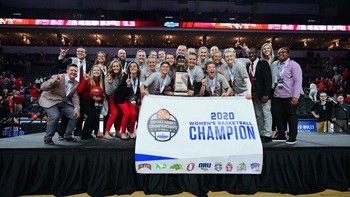Veterans Helped Launch Physician Assistant Concept
“If it weren’t for veterans, there wouldn’t be a PA profession,” said Wade Nilson, chair of the physician assistant program at the University of South Dakota, which began in 1993.
The first class of PAs was assembled at Duke University in 1965 and consisted of four veteran Navy hospital corpsmen who already had received considerable medical training during their military service. The first PA curriculum was based on fast-track training of doctors during World War II.
Modern physician assistants attend many of the same classes as medical students but spend less time on their formal education because they are not required to undertake a residency. PAs now provide important health care services in all areas of every state, and opportunity forecasts for the profession are among the brightest in the employment sector.
Of the 390 PAs who have graduated from USD's program, 175 are working in South Dakota. The program currently accepts 25 new students each year, and 20 of them must be South Dakota residents. A critical mission of the USD program is to provide rural areas with skilled health care providers.
Three military veterans are currently enrolled in USD’s PA program, including Alex Sherlock, a former member of an elite naval group known as the SWCC (Special Warfare Craft Crewman) that supports SEAL units. During numerous secret assignments in eastern Asia, Sherlock piloted a special vessel that delivered and retrieved SEALs on various missions and also operated large weaponry on the craft.
“We did special operations that often involved direct actions, including capturing high-value targets,” said Sherlock, a chief petty officer. “It was exciting stuff.”
Another type of operation involved medical missions to help people in remote areas of the Philippines.
“We transported medical supplies and doctors to rural villagers who desperately needed help,” said Sherlock, who also provided security for the visiting physicians. “Those were among the most gratifying experiences for me while I was deployed, and those missions also got me thinking about medical service as a career.”
Sherlock earned his undergraduate degree from USD in criminal justice before joining the Navy. He served in active duty for seven years and has been in the reserves since 2010. He started in the physician assistant program in 2014 and after a one-year clinical experience will graduate in 2016.
Sherlock, who is married with two small children, plans to work in a small-town hospital emergency room and also serve as a PA in the Navy Reserve.
“USD’s program is terrific, but my military service was also invaluable. It showed me how to handle adversity and get things done,” he said. “During duty in the Navy I learned how to be resourceful and resilient. My military experiences taught me how to be patient during tough situations. These attributes will serve me well in my work providing health care.”


